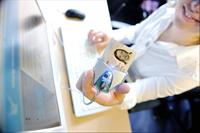For or against the e-voting - the example of Estonia
Adelina Marini, June 22, 2009
 For the European elections 58,669 people of 909,326 eligible to vote, have voted via Internet ... in Estonia. This is 15% of all voters - as many as the DPS (The Bulgarian party, representing the Turkish ethnic minority) gained on the European elections at home. The online voting system in Estonia started developing in 2002 and it was tested for the first time at the local elections in 2005. In 2007 Estonia is the first country in the world to hold e-voting for the general elections! This are the data that the Estonian embassy in Bulgaria very kindly provided euinside after we asked more information, having heard that the small Baltic state intends to vote online for the European elections as well. And more - of those 909,326 eligible voters only 399,181 have actually voted. Of them 58,669 have done it via the Internet! At the Parliamentary elections in 2007 the eligible voters were 897,243, of which 555,463 voted and of them 30,243 did it online. In 2005 only 9,287 voted online.
For the European elections 58,669 people of 909,326 eligible to vote, have voted via Internet ... in Estonia. This is 15% of all voters - as many as the DPS (The Bulgarian party, representing the Turkish ethnic minority) gained on the European elections at home. The online voting system in Estonia started developing in 2002 and it was tested for the first time at the local elections in 2005. In 2007 Estonia is the first country in the world to hold e-voting for the general elections! This are the data that the Estonian embassy in Bulgaria very kindly provided euinside after we asked more information, having heard that the small Baltic state intends to vote online for the European elections as well. And more - of those 909,326 eligible voters only 399,181 have actually voted. Of them 58,669 have done it via the Internet! At the Parliamentary elections in 2007 the eligible voters were 897,243, of which 555,463 voted and of them 30,243 did it online. In 2005 only 9,287 voted online.
The e-voting is actually meant to supplement and not to replace entirely the traditional ways of voting. The idea is to give voters the possibility to vote from a location of their choice - home or the office without the necessity of going to the polling station. But it is important to note, as the Estonian Foreign Ministry explains, that those who vote online should do it 6 to 4 days before the day of the elections. The procedure takes no more than 2 min.
And because there is a constant discussion lately about introducing the e-voting system in Bulgaria as well, it would be good to know that the e-voting is, in fact, a very small part of the e-government of Estonia which is possible because of some very important facts:
1. Some 66% of the population of Estonia (1.3 mn people) aged 16-74 use the internet, according to the statistical data from 2008;
2. 58% of the households have internet capabilities (again according to the 2008 data);
3. ALL Estonian schools are connected to the internet;
4. In addition to the Public Internet Access Points, there are 1,100 spots where the users can have very good wi-fi connections and those regions are constantly expanding. And that is free;
5. In 2009 91% of the income tax declarations have been filed via the Internet;
6. And something very important - the expenditures made by the government can be followed on the internet in REAL TIME!
7. Cabinet meetings have been changed to paperless sessions using a web-based document system, which is something the minister of state administration of Bulgaria, Nikolay Vassilev, introduced the paperless sessions quite successfully in many municipalities in Bulgaria and at the Council of Ministers as well;
8. Mobile phones in Estonia prevail over the population - 147 phones for every 100 people. That is why, as in interview for the euinside the Estonian ambassador to Bulgaria Rein Oidekivi explains, the next general elections in 2012 the mobile phone voting will be introduced.
 I don't know about you, my dear readers, but I personally, was sitting astonished watching these data in the embassy of Estonia in Sofia, not able to believe that something like this was possible and the good part is still to come. The next lines are dedicated to the life in Estonia, the crisis and other curious things which His Excellency Oidekivi told me in a very hot afternoon last week.
I don't know about you, my dear readers, but I personally, was sitting astonished watching these data in the embassy of Estonia in Sofia, not able to believe that something like this was possible and the good part is still to come. The next lines are dedicated to the life in Estonia, the crisis and other curious things which His Excellency Oidekivi told me in a very hot afternoon last week.
So, you can e-vote with your personal ID card which has a chip. With this card you can also pay your bills, travel throughout the EU and even present it to the traffic police instead of your driving license. Beside this, if the traffic police actually stops you they can also check in a few seconds whether you have and what for any sanctions and fines. What is very interesting to know in the comparison with Bulgaria is that having such a personal ID card is not obligatory as it is in Bulgaria. The good thing is that for many reasons Bulgaria still cannot introduce the personal ID cards with chips because of numerous fails of the public tenders. But the Estonians can use their current documents until their expiry date.
The card authentication can be done through a smart card reader with valid certificates and PIN codes. There is no problem for you to use your card under Windows, MacOS or Linux.
Of course, there were people who were against the e-voting system and their main argument was the security of the vote. But reason prevailed because in Estonia you can vote via traditional mail service. What's the guarantee then that someone had not forced you to change your vote before you could cast it in the post office? And what is the guarantee that someone, before you enter the polling booth, had not forced you to change your vote? So the Supreme court of Estonia decided that e-voting was not a problem and, as mentioned above, it is a fact for some years now.
According to ambassador Oidekivi the reason the e-government to be that advanced is that more and more people need to use services online. Those that are already being offered in Estonia, beside the personal ID cards with chip and the e-voting, are: paying by mobile phone, paying a parking place via SMS (which we have in Sofia too), e-school which gives the parents the opportunity to see what their kids' homework is, how they behave in class and what their marks are without being forced to go to school often. 220 schools in Estonia have this system which is 35% of all Estonian schools. Beside this, it is possible for young Estonians to submit admission applications to higher education institutions online without having to physically go to the school. They can also file their income tax declarations, property declarations, to check the results from exams.
His Excellency the Estonian ambassador also explained that the state has a policy to stimulate people to buy homes by paying them back a certain percentage of the deal. From the moment you file the declaration for the mortgage 2 days pass and the state pays back. The same thing goes with the additional language courses of your kids. The state covers part of the price and if it takes you 2 min to inform the relevant institution that your kids have started to study a new language, in up to 2 days the money is back into your account. This is how the Estonian state stimulates people to make their children study foreign languages.
Mr. Oidekivi thinks that with companies the situation might not be that quick because much more documents are required because of the different types of taxation. But the fact is that you can register a company in less than 2 hours. And that's the idea, explains the diplomat who with the inherent to Scandinavians openness and smile, answers all my questions. So, the idea is to save time, and save the need people to pile up in front of an institution. But still there are 10% of people who prefer paper documents. The system, in general, is quite simplified but this, according to ambassador Oidekivi is due to the fact that Estonia is a tiny country which does not need to bureaucratize.
E-government in the US for example would be hard to achieve. Instead, the Estonian diplomat says that Bulgaria can easily fit in the term small compact countries where e-government is possible. It has actually started but, who knows why, is developing quite slowly. Rein Oidekivi remembers the glory of Bulgaria in the field of IT and if today it that glory is not that big, it is a good basis for the development of e-government in Bulgaria. He adds that Estonia has turned into an innovative lab because innovations are easy to introduce in small countries than in bigger.
Another reason for Estonia being so advanced in e-government is that because of the Soviet heritage, being part of the Soviet Union before, the country was lagging behind and had to start everything anew. Another factor is that Estonia is neighbouring the too developed Scandinavian  countries which support the Baltic minors. This support is possible because of their common history and in the case of Estonia and Finland - because of their close languages - from the ugaro-finnish group. Only last year 7.5 mn people used the ferry lines from Tallinn to Helsinki and vice versa and the line Tallinn-Stockholm. You can pick up the ferry from the city centre and after and hour and a half you will be in the centre of Stockholm or Helsinki. This makes the ferry line quicker than the plane. The flight is only 20 min. but without the checking and the traveling from the airport to the city centre.
countries which support the Baltic minors. This support is possible because of their common history and in the case of Estonia and Finland - because of their close languages - from the ugaro-finnish group. Only last year 7.5 mn people used the ferry lines from Tallinn to Helsinki and vice versa and the line Tallinn-Stockholm. You can pick up the ferry from the city centre and after and hour and a half you will be in the centre of Stockholm or Helsinki. This makes the ferry line quicker than the plane. The flight is only 20 min. but without the checking and the traveling from the airport to the city centre.
The third reason for the decision of the Baltic state to turn to e-government is, please note, that they are a small nation and cannot spare resources to maintain a large state bureaucracy! Unlike Bulgaria which had a large leak of IT brains, having taken the decision for e-government early, Estonia managed to keep its specialists at home with enough and well paid work. In fact, I myself did not know that it was Estonians that creates Skype. Nevertheless Estonia needs people and ideas and relies that it could cooperate with Bulgaria in this field. Negotiations are taking place but, ambassador Oidekivi is aware that because of the elections, he will have to wait until Autumn to see whether such a partnership is possible and how.
It is curious that the Estonians are negotiating with Macedonia which is also very interested in e-government. Here, I noted, that being a tiny country, Macedonia could repeat Estonia's success. Our western neighbours have even started to introduce already tested in Estonia ideas.
(Part II will follow)